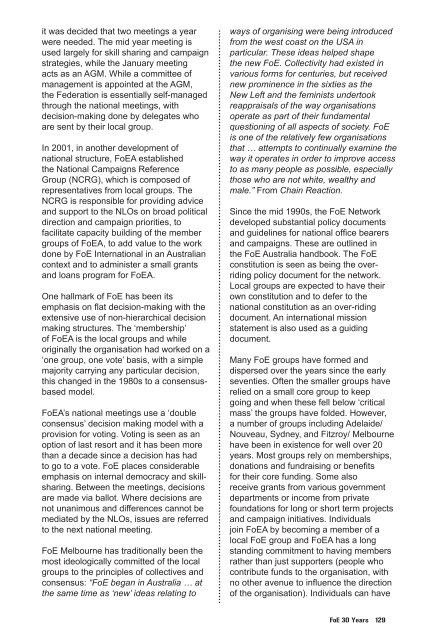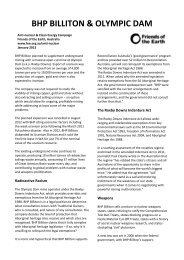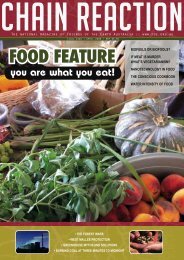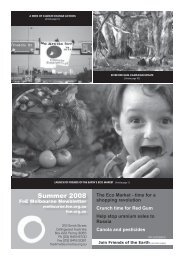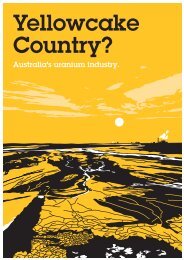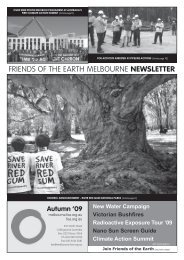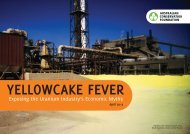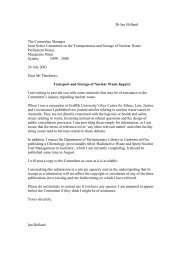Thirty Years of Creative Resistance - Friends of the Earth Australia
Thirty Years of Creative Resistance - Friends of the Earth Australia
Thirty Years of Creative Resistance - Friends of the Earth Australia
Create successful ePaper yourself
Turn your PDF publications into a flip-book with our unique Google optimized e-Paper software.
it was decided that two meetings a year<br />
were needed. The mid year meeting is<br />
used largely for skill sharing and campaign<br />
strategies, while <strong>the</strong> January meeting<br />
acts as an AGM. While a committee <strong>of</strong><br />
management is appointed at <strong>the</strong> AGM,<br />
<strong>the</strong> Federation is essentially self-managed<br />
through <strong>the</strong> national meetings, with<br />
decision-making done by delegates who<br />
are sent by <strong>the</strong>ir local group.<br />
In 2001, in ano<strong>the</strong>r development <strong>of</strong><br />
national structure, FoEA established<br />
<strong>the</strong> National Campaigns Reference<br />
Group (NCRG), which is composed <strong>of</strong><br />
representatives from local groups. The<br />
NCRG is responsible for providing advice<br />
and support to <strong>the</strong> NLOs on broad political<br />
direction and campaign priorities, to<br />
facilitate capacity building <strong>of</strong> <strong>the</strong> member<br />
groups <strong>of</strong> FoEA, to add value to <strong>the</strong> work<br />
done by FoE International in an <strong>Australia</strong>n<br />
context and to administer a small grants<br />
and loans program for FoEA.<br />
One hallmark <strong>of</strong> FoE has been its<br />
emphasis on flat decision-making with <strong>the</strong><br />
extensive use <strong>of</strong> non-hierarchical decision<br />
making structures. The ‘membership’<br />
<strong>of</strong> FoEA is <strong>the</strong> local groups and while<br />
originally <strong>the</strong> organisation had worked on a<br />
‘one group, one vote’ basis, with a simple<br />
majority carrying any particular decision,<br />
this changed in <strong>the</strong> 1980s to a consensusbased<br />
model.<br />
FoEA’s national meetings use a ‘double<br />
consensus’ decision making model with a<br />
provision for voting. Voting is seen as an<br />
option <strong>of</strong> last resort and it has been more<br />
than a decade since a decision has had<br />
to go to a vote. FoE places considerable<br />
emphasis on internal democracy and skillsharing.<br />
Between <strong>the</strong> meetings, decisions<br />
are made via ballot. Where decisions are<br />
not unanimous and differences cannot be<br />
mediated by <strong>the</strong> NLOs, issues are referred<br />
to <strong>the</strong> next national meeting.<br />
FoE Melbourne has traditionally been <strong>the</strong><br />
most ideologically committed <strong>of</strong> <strong>the</strong> local<br />
groups to <strong>the</strong> principles <strong>of</strong> collectives and<br />
consensus: “FoE began in <strong>Australia</strong> … at<br />
<strong>the</strong> same time as ‘new’ ideas relating to<br />
...................................................................................................................................................................................................<br />
ways <strong>of</strong> organising were being introduced<br />
from <strong>the</strong> west coast on <strong>the</strong> USA in<br />
particular. These ideas helped shape<br />
<strong>the</strong> new FoE. Collectivity had existed in<br />
various forms for centuries, but received<br />
new prominence in <strong>the</strong> sixties as <strong>the</strong><br />
New Left and <strong>the</strong> feminists undertook<br />
reappraisals <strong>of</strong> <strong>the</strong> way organisations<br />
operate as part <strong>of</strong> <strong>the</strong>ir fundamental<br />
questioning <strong>of</strong> all aspects <strong>of</strong> society. FoE<br />
is one <strong>of</strong> <strong>the</strong> relatively few organisations<br />
that … attempts to continually examine <strong>the</strong><br />
way it operates in order to improve access<br />
to as many people as possible, especially<br />
those who are not white, wealthy and<br />
male.” From Chain Reaction.<br />
Since <strong>the</strong> mid 1990s, <strong>the</strong> FoE Network<br />
developed substantial policy documents<br />
and guidelines for national <strong>of</strong>fice bearers<br />
and campaigns. These are outlined in<br />
<strong>the</strong> FoE <strong>Australia</strong> handbook. The FoE<br />
constitution is seen as being <strong>the</strong> overriding<br />
policy document for <strong>the</strong> network.<br />
Local groups are expected to have <strong>the</strong>ir<br />
own constitution and to defer to <strong>the</strong><br />
national constitution as an over-riding<br />
document. An international mission<br />
statement is also used as a guiding<br />
document.<br />
Many FoE groups have formed and<br />
dispersed over <strong>the</strong> years since <strong>the</strong> early<br />
seventies. Often <strong>the</strong> smaller groups have<br />
relied on a small core group to keep<br />
going and when <strong>the</strong>se fell below ‘critical<br />
mass’ <strong>the</strong> groups have folded. However,<br />
a number <strong>of</strong> groups including Adelaide/<br />
Nouveau, Sydney, and Fitzroy/ Melbourne<br />
have been in existence for well over 20<br />
years. Most groups rely on memberships,<br />
donations and fundraising or benefits<br />
for <strong>the</strong>ir core funding. Some also<br />
receive grants from various government<br />
departments or income from private<br />
foundations for long or short term projects<br />
and campaign initiatives. Individuals<br />
join FoEA by becoming a member <strong>of</strong> a<br />
local FoE group and FoEA has a long<br />
standing commitment to having members<br />
ra<strong>the</strong>r than just supporters (people who<br />
contribute funds to <strong>the</strong> organisation, with<br />
no o<strong>the</strong>r avenue to influence <strong>the</strong> direction<br />
<strong>of</strong> <strong>the</strong> organisation). Individuals can have<br />
FoE 30 <strong>Years</strong> 129


